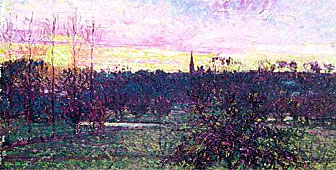Switzerland prepares to fight art trafficking

The Swiss government has presented a new law to fight trafficking of stolen cultural goods, in line with international conventions.
The new law, which has still to go through Parliament, follows the guidelines set down by the Unesco Convention of 1970, regulating the international transfer of cultural objects.
The move will bring Switzerland’s art market, the world’s fourth largest, in line with those of more than 90 nations. It comes hot on the heels of a reported increase in the illicit traffic of art objects in Switzerland.
“Illicit transfers of cultural goods around the world are one of biggest types of trafficking, along with drugs, said Andreas Rascher, of the Federal Office for Culture.
“Switzerland is one the main players in the arts business, so the risk of illicit trafficking is taking place here is therefore high.”
So far, Switzerland has no legal mechanism governing the transfer of cultural goods. The Swiss were also not bound to any international conventions, unlike neighbouring countries.
Too many loopholes
“The result is that other states are insufficiently protected from transactions carried out in Switzerland, ” Rascher told swissinfo. “With this ratification, Switzerland will catch up with legal international standards governing cultural goods.”
The authorities believe current Swiss legislation offers too many loopholes to art traffickers. The proposed law doesn’t entirely satisfy art dealers, though, who are worried it might lead to the creation of a kind of art police.
“The art market sees there is a necessity,” said Rascher, “but it does not necessarily agree with the proposed method.”
The Unesco convention came into effect over 30 years ago, but much of the art world has been hostile to its implementation until recently.
“The realisation there is a problem has only taken place in the past few years, with the analysis of what happened during the Second World War and the role of Switzerland’s art market,” Rascher told swissinfo.
“People weren’t necessarily prepared to tackle the problem, not unlike what happened with money laundering.”
The law regulates the import and export of works of art, and the return to the country of origin of stolen works. It also reinforces the protection of Swiss cultural goods as well as those of other countries.
swissinfo

In compliance with the JTI standards
More: SWI swissinfo.ch certified by the Journalism Trust Initiative
You can find an overview of ongoing debates with our journalists here. Please join us!
If you want to start a conversation about a topic raised in this article or want to report factual errors, email us at english@swissinfo.ch.